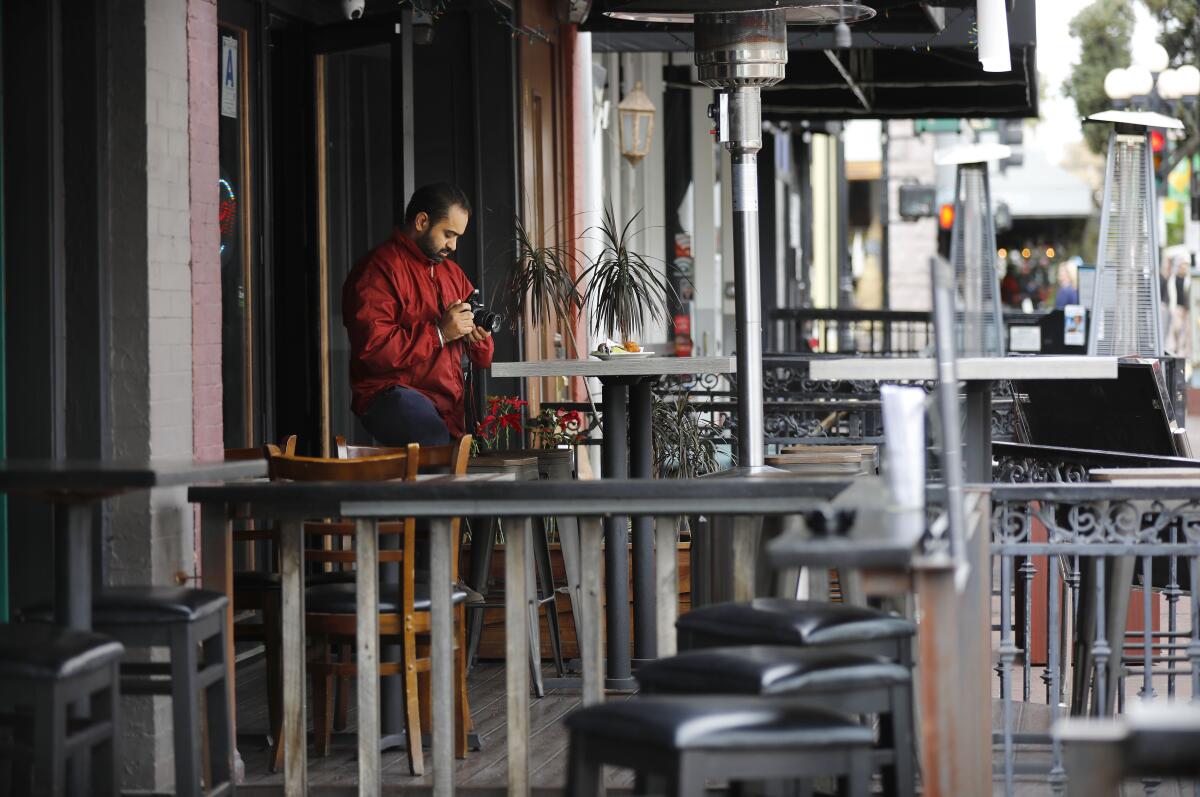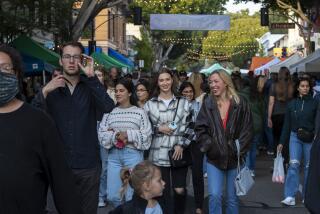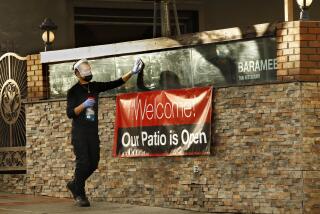What are the coronavirus restrictions in my community? A guide for Southern California

Southern California has taken sweeping measures this week to stop dine-in restaurant service, close gyms and movie theaters, and ban or limit all gatherings to fight the spread of the coronavirus.
The measures, as of Thursday, in most parts of Southern California were not as stringent as those imposed in 17 counties in the Bay Area, North Coast, Sacramento Valley and Central Coast, which asked residents to shelter in place and stay home as much as possible in the coming weeks, and forcing all but essential businesses to close.
The coronavirus outbreak has killed 19 people across California, including three people in the Coachella Valley in Riverside County — all over the age of 70, with two of them having underlying health conditions — and two people in Los Angeles County, a 68-year-old retiree on her way home to Florida from a trip to Asia, and a man between the ages of 30 and 50 with an underlying medical condition.
The virus strikes hardest among older people and those with underlying medical conditions; a viral infection of the lungs can begin a cascade of problems that results in respiratory failure, septic shock and multiple organ failure.
Unlike most of the counties in the Bay Area, each of Southern California’s most populous counties has taken different approaches to slowing the spread of the virus. As of Thursday, none of the counties has the same rules over whether restaurants must serve food only to go; whether bars, gyms and movie theaters should be required to close; and how big gatherings must be to be prohibited.
Stay at home as much as possible, officials say, but there are exceptions, like to go out and get food, pick up medicine, buy gas, go to the bank and check up on relatives.
Violations of health orders can be enforceable as a misdemeanor, punishable by a fine, imprisonment or both.
Here’s a summary of the new restrictions, first by the kind of restriction, and then by geography:
Ban on dine-in eating
- Los Angeles, Orange, San Bernardino, Ventura and San Diego counties required restaurants to offer food by takeout or delivery only. Also issuing the same order was the city of Palm Springs in Riverside County’s Coachella Valley, which imposed a shelter-in-place order modeled on the one issued in the San Francisco Bay Area.
Order to close bars
- Los Angeles, Orange, San Bernardino, Ventura and San Diego counties and Palm Springs ordered bars that do not serve food to close.
Order to close gyms and movie theaters
- Ventura, Orange, San Bernardino and Los Angeles counties and Palm Springs ordered gyms and movie theaters to close.
Ban on gatherings
- Orange and San Bernardino counties and Palm Springs banned gatherings.
- Riverside County banned gatherings of 10 or more people.
- L.A. and San Diego counties have prohibited gatherings of 50 or more people.
Here’s a summary of the new restrictions by geography. Exceptions to the gathering ban can be found in the text of the health orders.
Los Angeles County
Gatherings: Gatherings of 50 or more people are banned anywhere within the jurisdiction of the Los Angeles County Department of Public Health, which does not include Long Beach, Pasadena or Vernon.
Gatherings of 10 to 49 people in a confined or enclosed space are not banned, but organizers must do the following:
- Require attendees present for more than 10 minutes to be separated by at least 6 feet from other attendees.
- Provide access to hand-washing facilities with soap and water or with hand sanitizer with at least 60% alcohol.
- Post a sign that tells people to leave if they are sick, such as having a fever or cough.
- Clean and disinfect the site.
Ordered shut:
- Bars and nightclubs that do not serve food.
- Movie theaters, live performance venues, bowling alleys and arcades.
- Gyms and fitness centers.
- Wineries, breweries and taprooms that provide tastings.
Restaurants:
- May offer food only by delivery, pickup or drive-through.
Effective: Now through March 31.
San Diego County
Gatherings: Gatherings of 50 or more people are banned.
Ordered shut: Bars, adult entertainment establishments and other businesses that serve alcohol but not food.
Restaurants: May offer food only by delivery, pickup or drive-through.
Effective: Now through March 31.
Orange County
Gatherings: Gatherings are prohibited.
Ordered shut:
- All bars and other establishments that serve alcohol and not food.
- Movie theaters, gyms and health clubs.
Restaurants: May offer food only by delivery, pickup or drive-through.
Effective: Now through March 31.
Riverside County
Gatherings: Gatherings of 10 or more people are prohibited.
Effective: Now through April 30.
Exceptions: The city of Palm Springs plans to issue a more stringent shelter-in-place order.
City of Palm Springs
The city of Palm Springs issued an emergency order modeled on the “shelter-in-place” order in effect in San Francisco. The order in San Francisco is similar to the one in effect in the eight other Bay Area counties — San Mateo, Santa Clara, Alameda, Contra Costa, Sonoma, Marin, Napa and Solano, as well as Santa Cruz, Monterey, San Benito, Sacramento, Yolo, Mendocino, Lake and San Luis Obispo counties. Here’s what that looks like:
Ordered to shelter in place: The public should stay at home as much as possible, with certain exceptions — such as to go to the supermarket, pick up prescriptions or go to the doctor; exercise, such as walking, running or hiking; and to check on relatives. There are exceptions for certain essential government and business functions.
Exceptions to the stay-at-home order:
- To do things essential to health and safety of the household, including pets, like getting medical supplies, visiting a clinic or hospital, or obtaining supplies to work from home.
- To obtain needed services or supplies, like buying groceries.
- To engage in outdoor activities like walking, hiking, running, and taking the dog for a walk, while keeping 6 feet away from others.
- To do work for essential businesses that are exempted from the order to shut down, as defined below.
- To care for a family member or pet in another household.
- To continue working for a healthcare operation, like a hospital, clinic, dentist’s office, pharmacy, pharmaceutical and biotech company, a healthcare facility, healthcare supplier, home healthcare service, mental health provider, veterinary office or other related services.
- To continue working for construction projects needed for essential infrastructure, such as building housing, airport operations, and work on water, sewer, gas, electrical, oil refining, roads and highways, public transportation, solid waste collection, internet and telecom systems.
- To continue working as first responders, emergency management personnel, emergency dispatchers, court personnel and law enforcement. Anyone needed to ensure the continuing operation of government agencies and provide for the health, safety and welfare of the public is exempt.
Gatherings: Gatherings are prohibited.
Ordered shut: All businesses, including bars, gyms and movie theaters, must cease operations.
Exceptions to the order to shut down: Essential businesses or firms that perform an essential government function can continue operating. They include:
- Healthcare operations, including home health workers;
- Essential infrastructure, including construction of housing and operation of public transportation and utilities;
- Grocery stores, farmers markets, food banks, convenience stores;
- Businesses that provide necessities of life for economically disadvantaged individuals and shelter facilities;
- Pharmacies, healthcare supply stores and healthcare facilities;
- Gas stations and auto repair facilities;
- Banks;
- Garbage collection;
- Hardware stores, plumbers, electricians, pool service, landscape maintenance, exterminators and other service providers necessary to maintain the safety, sanitation and essential operation of residences and other essential businesses;
- Educational institutions, for the purposes of facilitating distance learning;
- Laundromats, dry cleaners and laundry service providers;
- Businesses that ship or deliver groceries, food and goods directly to residences;
- Businesses that supply products needed for people to work from home, including electronic stores, mobile phone stores and office supply stores;
- Airlines, taxis and other transportation providers offering services needed for essential activities;
- Home-based care for seniors, adults or children;
- Childcare facilities providing services that enable essential employees to go to work, but must be carried out in groups of 12 or fewer, and that children do not mix between groups;
- Roles required for any essential business to “maintain basic operations,” which include security, payroll and similar activities.
- Hotels, motels and lawfully permitted vacation rentals and homesharing, provided that they comply with social distancing requirements;
- Licensed cannabis dispensaries and lounges, provided that cannabis products are picked up, or if licensed to do so, taken for delivery; the lounge areas shall not be used.
Restaurants: May offer food only by delivery, pickup or drive-through.
Effective: March 18 to April 2.
San Bernardino County
Gatherings: Gatherings are prohibited.
Ordered shut:
- Bars, adult entertainment establishments and other businesses that serve alcohol and not food;
- Movie theaters, gyms and health clubs.
Restaurants:
- Must offer food only by delivery, pickup or drive-through.
Effective: Now through April 6.
Ventura County
Ordered to shelter in place: Those 75 or older and those 70 or older with underlying medical conditions, except for needed trips outside home, such as for getting medical care or food. If they need to take a trip outside, they must at all times as reasonably possible keep at least 6 feet away from anyone else.
Ordered shut:
- Bars and nightclubs that do not serve food;
- Movie theaters, live performance venues, bowling alleys and arcades;
- Gyms, fitness centers and aquatic centers;
- Wineries, breweries and tap rooms that provide tastings.
Restaurants:
- May offer food only by delivery, pickup or drive-through.
Effective: Now through April 1.
City of Long Beach
Long Beach is one of three cities in Los Angeles County with its own public health department.
Gatherings: Gatherings of 50 or more people are banned. Gatherings of 10 to 49 people in a confined or enclosed space are not banned, but organizers must do the following:
- Require attendees present for more than 10 minutes to be separated by at least 6 feet from other attendees;
- Provide access to handwashing facilities with soap and water or with hand sanitizer with at least 60% alcohol;
- Post a sign that tells people to leave if they are sick, such as with a fever or cough;
- Clean and disinfect the site.
Ordered shut:
- Bars, pubs, cocktail lounges and nightclubs that do not serve food;
- Movie theaters, live performance venues, bowling alleys and arcades;
- Gyms and fitness centers;
- Wineries, distilleries, breweries and taprooms that do not serve food or are not licensed to sell bottled or packaged alcohol off the licensed premises.
Restaurants:
- May offer food only by delivery, pickup or drive-through.
Effective: Now through March 31.
More to Read
Sign up for Essential California
The most important California stories and recommendations in your inbox every morning.
You may occasionally receive promotional content from the Los Angeles Times.










